  |
 |
 |
 |
|
MahdiWatch.org
|
 |
|
Home | About Me | Links to My Articles | Info on My Books | Contact Me
|
 |
|
Welcome to MahdiWatch.org! NEWSFLASH! COMMENTS LINK
BELOW EACH POST IS ENABLED! FEEL FREE TO BURY ME, PRAISE ME--OR JUST ISSUE A PERSONAL FATWA!
al-Mahdi is "the rightly-guided one" who, according to Islamic Hadiths (traditions),
will come before the end of time to make the entire world Muslim. Over the last 1400 years numerous claimants to the
mantle of the Mahdi have arisen in both Shi`i and Sunni circles. Modern belief in the coming of the Mahdi has
manifested most famously in the 1979 al-`Utaybi uprising of Sa`udi Arabia, and more recently in the ongoing
Mahdist movements (some violent) in Iraq, as well as in the frequently-expressed public prayers of former Iranian
President Ahmadinezhad bidding the Mahdi to return and, in the larger Sunni Islamic world, by claims that Usamah bin Ladin
might be the (occulted) Mahdi. Now in 2014 Mahdism is active in Syria, as the jihadist opposition group Jabhat al-Nusra
claims to be fighting to prepare the way for his coming; and in the new "Islamic State/caliphate" spanning
Syrian and Iraqi territory, as its leadership promotes the upcoming apocalyptic battle with the West at Dabiq, Syria. This site will track such Mahdi-related movements, aspirations, propaganda and beliefs in both Sunni and Shi`i
milieus, as well as other Muslim eschatological yearnings.
For a primer
on Mahdism, see my 2005 article, "What's Worse than Violent Jihadists?," at the History News Network: http://hnn.us/articles/13146.html; for more in-depth info, see the links here to my other writings, including my book on Mahdism.
|
|
|
|
Thursday, August 30, 2012
Senior Iraqi Politician: The Mahdi Hates the Kurds and their Ways
Yesterday the Iraqi Kurdish media outlet "Rudaw" ("The Happening") ran a fascinating, and rather disturbing,
article entitled "Shia Leader: The Awaited Imam Mahdi Will Fight the Kurds." The "Shia leader" in question is a former Majlis (Parliament) member and senior figure in the Islamic Supreme Council of Iraq (formerly the Supreme Council for the Islamic Revolution in Iraq), Jalal al-Din Ali al-Sahgir (or "Sagheer"). ISCI (or SIIC) is the second-largest party in the Iraqi Majlis, holding some 52 of 440 seats,
and is quite powerful in Basra and southern Iraq particularly via its armed Badr militia. So when al-Sahgir speaks on Mahdism, it's worth weighing his words. According to "Rudaw," back
on August 10 al-Saghir delivered a khutbah in Baghdad's Buratha Mosque (of which he is the imam) in which he speculated that
recent political events in Syrian Kurdistan might be signs of the impending arrival of the 12th Imam al-Mahdi--especially,
eschatologically, if an earthquake were to strike there, and Turkish troops were to move into the Cizre/Malikiyah area; al-Sahgir also is said to have mused that Syria would fracture into five polities, including a Kurdish one
which would be obliterated by the Turks. He also, allegedly, referred to Kurds of Syria and Iraq as mariqah or
maraqah, "renegades" or "heretics," whom the Mahdi will combat, along with "converted Shia"--but
claimed subsequently to have meant the "Kurdish autonomous region" and not the Kurds themselves. According
to Professor Nawzad Koshnaw, Arabic professor at Salahaddin University in Erbil (Iraqi Kurdistan), al-Sahgir's employment
of mariqah is tantamount to khawarij, the "rebels" in the early history of Islam whom the
fourth Sunni Caliph (and first Shi`i Imam), Ali, fought against--and thus al-Saghir clearly implied that "the Kurds are
deserting the laws...of the Iraqi government, and therefore Imam Mahdi will appear and fight the Kurds." 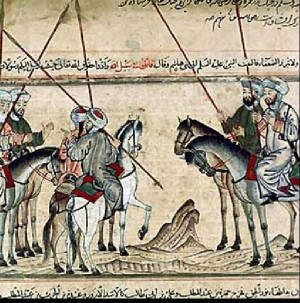
Battle of Badr, 624 AD/2 AH. "Remind me again, guys--are we the mariqah, or are they?" Observations: 1)
Modern Iraqi Mahdism has, heretofore, been largely a phenemenon manifesting among outre groups there: Ahmad al-Hasan's Ansar
al-Mahdi, the late Abd al-Zahra al-Qar`awi's Jund al-Sama', or Mahmud al-Hasani al-Sarkhi's Jaysh Husayn,
as well as (albeit probably more politically and less seriously) Muqtada al-Sadr's Jaysh al-Mahdi. Now, however,
a mainstream Iraqi politician is espousing Mahdist views--and not just pious ones reflecting some far-off, future hope but
beliefs working eschatology into the modern political scene in the Middle East. When George Bush ordered the US military into
Iraq to take down Saddam, had none of his advisors ever apprised him of the apocalyptic attitudes prevalent in Twelver Shi`ism--or
the dangers of letting the mahdist jinn out of its secular, Ba`athist bottle? 2) Ali al-Saghir not
only advances ambiguous apocalyptic auguries--he identifies one particular group, the Kurds, as enemies of the Mahdi. Most
Kurds are Sunni Muslims, and some (particularly in Iran and even some in southern Iraq) are even Twelver Shi`i. Nonetheless,
Imam al-Saghir feels no qualms about singling them out for Mahdist opprobrium--primarily, it would appear, not on religious
grounds but on a political one: insufficient loyalty to the post-Saddam Iraqi state. 3) The
leadership of ISCI/SCII has, since the group's founding with Iranian supervision in 1982, been not just pro-Iranian but pro-vilayet-i
faqih ("rule of the [Shi`i] jurisprudent," Khomeini's signature political concept). In the Islamic Republic
of Iran adherence to this concept has been largely equated with loyalty to the Tehran regime itself. Iraq, however,
does not have Twelver Shi`i clerical rule--at least not yet. Is al-Saghir signaling that this is the direction in which
Iraq's goverment must go, by his lights? Even more troubling, are his Mahdist critiques of the Kurds a way for him to preemptively
rule out an entire ethnolinguistic group from political legitimacy--and thus to set the stage for their purging, or worse,
should clerics like himself seize power in Baghdad? Take a look at al-Saghir's own website (if you can read Arabic), among which the interesting articles/lectures include the likes of "Who Are Yajuj
and Majuj?" (The Islamic equivalents of Gog and Magog described in the Bible in Ezekiel chapters 38 and 39, as well as
Revelation chapter 20.) 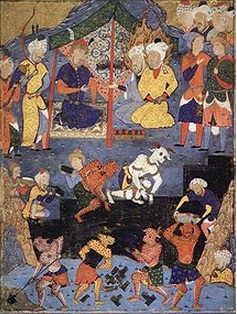
Dhu al-Qarnayn, the Qur'anic version of Alexander the Great, overseeing the incarceration of the
bestial hordes of Yajuj and Majuj. Does Ali al-Saghir see himself as Alex, and the Kurds as these negative eschatological
figures?
Wednesday, August 22, 2012
Up with the Mahdi and the Radio*
Here's the hour-long archived clip of me on Dr. Jamie Glazov's radio show last night (Aug. 21, 2012), discussing at some length Mahdism, eschatology (both
Muslim and Christian), the latest Pew study on Islamic beliefs and US policy toward the Muslim world. 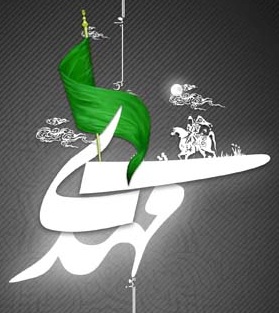
*Paraphrasing (slightly) U2's "Stay (Faraway, So Close)".
Tuesday, August 21, 2012
Radio Mahdi
10:25 am edt
Sunday, August 19, 2012
DHS Eschatological Threat Level, Post-Pew Study of Mahdism
10:30 pm edt
Monday, August 13, 2012
Day(s) of the Mahdi?!
Not content with my earlier blogpost examining the newest Pew data on Mahdism and other beliefs and attitudes among Muslims,
I penned (er, typed) a 2,700-word piece, going into even more detail and analysis, that is up on History News Network today:
"Mahdism (and Sectarianism and Supersition) Rises in the Islamic World." Seems this pulp writer from the 1980s was smarter than most modern Middle East analysts! 
Friday, August 10, 2012
Don't Leave a Live (or Occulted) Mahdi Out of Your Calculations
Rumors of my demise, or occultation, have been greatly exaggerated; rather, in July I was on a family vacation (finally
getting to see Maine!) and, upon returning from New England, had in short order to leave for the Left Coast (working trip),
followed by another out-of-town lecture and, finally, this past week my boys went back to school. So it's time
to get back in the eschatological saddle (like this chap):

The most notable--indeed, strikingly important--news about Mahdism to be revealed recently comes from the
Pew Forum on Religious Life's latest study, "The World's Muslims: Unity and Diversity" (released yesterday, August 9, 2012) which surveyed tens of thousands of Muslims in 24 different countries. Under
the subcategory "Articles of Faith" there is fascinating--and disturbing--data on belief in the Mahdi's imminent (in one's lifetime) return:
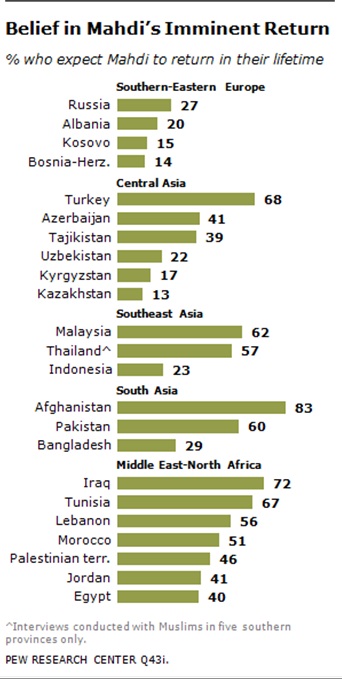
Observations and Analysis:
1) Of the 23 countries whose Muslim citizens were polled, nine
have majorities which expect the Mahdi in their lifetimes, with the overall average percentage at 41.8%--and considering
the huge samples and wide geographic latitude which Pew used, it is safe to extrapolate this percentage to Islam as a whole;
ergo, 42% of 1.6 billion = 672 million Muslims who believe in the Mahdi's imminent return! This is FAR greater than I had
supposed: since starting studying Mahdism in the mid-1990s, I had always estimated that only about 10% of Sunnis believed
thusly--but using this data for just majority-Sunni populations (taking out Azerbaijan, Lebanon and Iraq in the Pew sample),
the average is even higher: 45%! Further, note that the MOST-Shi`i (Twelver) country in the world, Iran, was not surveyed.
Bottom-line: Mahdism is a far stronger and more-widely held belief than even I had thought--and I've been preaching its pervasiveness
for years.
2) Despite the conventional wisdom (repeated even by Pew, in the face of their own data) that Mahdism
is primarily the province of Shi`is, note that three of the four countries with the highest percentage expecting
the Mahdi are majority-Sunni ones: Afghanistan (83%), Turkey (68%) and Tunisia (67%). This has ramifications, respectively, for:
US policy in a country we are currently occupying; the only NATO Muslim-majority nation; and the vanguard state of the "Arab
Spring." (Said ramifications which I will explore is a soon-to-be-published article.) At this juncture I would
only adduce the following explanatory theories: Afghanistan is so rife with Islamic messianism because the 80% of the population
that is Sunni and the 20% that is Shi`i (albeit Sevener/Isma'ili, as well as Twelver) both are in the middle of a war
and occupation by a "Christian" power--which tends to ratchet up such expectations; Turkey's population, overwhemingly
Sunni, is being swayed by the "soft (and peaceful) Mahdism" of two major public intellectuals and Turkish Mahdists--Adnan
Oktar ("Harun Yahya") and Fethullah Gülen; Tunisia is in North Africa, the well-spring of some of Islam's most
powerful Mahdist movements, going back to Ibn Tumart (d. 1130 AD). Might Mahdism in Afghanistan have something to do
with the chronic opposition to US forces, up to and including the by-now regular murder of US soldiers by Afghan troops? This
is one topic I intend to explore in the promised upcoming article.
3) Seemingly contra the historical
association between Mahdism and Sufism, it does not seem to be the case (based on Pew's data) that overall belief in the Mahdi's
imminent return correlates, in the modern Islamic world, with adherence to Sufism (Islamic mysticism). Here is Pew's
Sufism data:
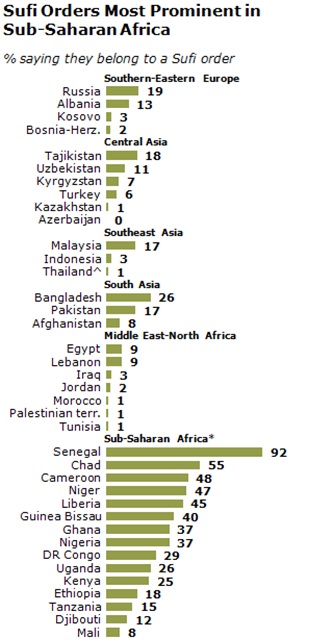
First, for the uninitiated, Sufism tends to be found in Sunni countries in the last several centuries--not
least because Twelver Shi`ism assimilated much of Sufism's mysticism, and (thus) both religiously and politically
Sufism came to be seen in places like Iran, Iraq and Azerbaijan as something of a threat to the establishment (hence
the low numbers of Sufis in Iraq and Azerbaijan, as well as Lebanon). That said, note that while it
does appear that the historical link between Sufism and Mahdism may have been severed--based on lack of Sufi order membership
in places like high-Mahdism areas like Turkey, Afghanistan and Tunisia--we do not know the degree of overlap between
the small percentages of Sufis in each country and Mahdist belief, much less the intensity of such belief. Historically,
as I've written about in various venues, many (if not most) violent Mahdist jihads have emerged from Sufi milieus.
There is anecdotal evidence from Iraq and other locales that this is still happening, this Pew data notwithstanding.
One very relevant future avenue of research is the strong Sufi adherence in Sub-Saharan Africa and Mahdism--because none of
the 15 African countries Pew surveyed for Sufi data was included in the Mahdism question.
4) Why is Mahdist
belief so LOW in former Soviet Central Asia--the 'stans, in particular Uzbeki-, Kyrgyz- and Kazakh-? Probably Marxist indoctrination
for decades has something to do with it; but then how does one explain the much higher (39%) Mahdism in Tajikistan?
This is worth further research, as well.
5) Lest we forget, there's another major positive (or
"good"--as opposed to negative/"evil" ones like al-Dajjal, "the Deceiver") Muslim eschatological
figure whom the Qur'an and the Muslim hadiths predict to return: `Isa b. Maryam, or Jesus (albeit, for Muslims, not "the
Christ" because he was never crucified nor resurrected and will return as a good Muslim).

And the Muslims were SO CLOSE on this one....
In Tunisia, Turkey and Iraq each some 2/3 of the folks believe
in Jesus' imminent return, while majorities of four other Muslim countries do so, as well; the overall average for the 22
countries surveyed is 35%--and, again, extrapolating to the Islamic world as a whole, that means some 435 million Muslims
look for Jesus to come back in their lifetimes! I'm not sure what this could portend for US foreign policy, but
Christians and their church leadership might want to seriously think about it. 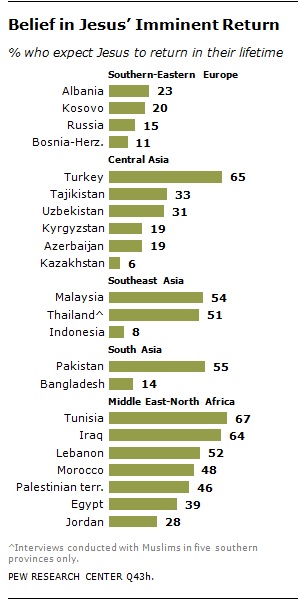
There is more in the Pew data, but that must wait for another blog--or publication.
In related
stories, the Pakistani Sunni blogger over at "Grande Strategy" has put up some videos prognosticating on when the Mahdi will arrive. Purveying abstruse numerological calculations drawing on Islamic hadiths and other more obscure and doubtful data
(such as the alleged existence and approach of the unseen planet Nabiru), Mr. Strategy maintains that the Mahdi's zuhur,
"manifestation," is probably no more than 14 years away.
Also, in a more prosaic vein, State
Security in Kyrgystan has arrested another member of that country's Jaysh al-Mahdi ("Army of the Mahdi"), whose "weapons cache" included "religious-extremist literature, combat
knives, bomb components, detonator capsules and fuses." This group's definition of Mahdism would seem to most closely
resemble that of the 16th c. Safavids (who forcibly converted Iran to Twelver Shi`ism):

Hold still, infidel! This will hurt me more than....just kidding.
"Grande Strategy" and
JAM in Kyrgystan (as well as an unholy host of other Mahdists) expect a Mahdi who will function as a global warlord, conquering
and, in some scenarios, slaughtering the world's non-Muslims till they convert or submit via death or dhimmitude. Which
view of Mahdism predominates among the Islamic world's 672,000,000 believers in the Mahdi's coming is currently still
unknown. Let us hope that rather than the jihadist Mahdi, most of the Mahdists among the world's second-largest faith
have something more like this in mind:

Jesus and the Mahdi peacefully comparing burning intensity of divine revelations.
.:
Bottom-line conclusions: 1) (An)other violent Mahdist movement(s) in the 21st century seems
very likely: if even 1% of 672 million is so inclined, that makes 6.72 million potential jihadist believers in the Mahdi 2)
Even more likely is a political consolidation movement among several Islamic countries or regions centered around a charismatic
leader claiming the Mahdiyah; if just 20 or 30% of the legions who believe in the Mahdi can be convinced to put a claimant
in charge, he would have between 100-200 million supporters! 3) The usual
State/Defense departments' "rational actor" approach to international relations might be quite simply irrelevant,
if almost half the world's Muslims expect the imminent return of their eschatological deliverer. 4)
Turkey is far more off the rails than we had thought, if it's true that almost 70% of that allegedly-pro-Western nation's
people expect the Mahdi to appear soon. 5) Afghanistan is a lost cause: over eight in ten of its people
expect the Mahdi in their lifetime, and no amount of roads and clinics and girls' schools built by the infidels will change
that.
|
|
|
|
| Jamkaran Mosque near Qom, Iran (during my trip there Aug. 2008) |
|
|
|
